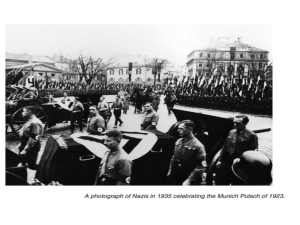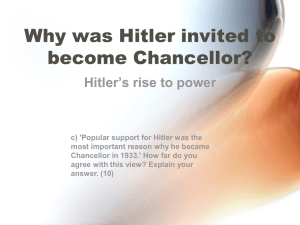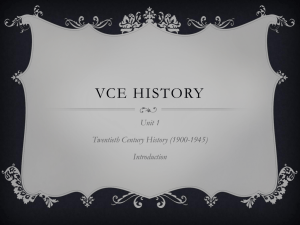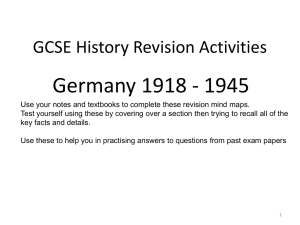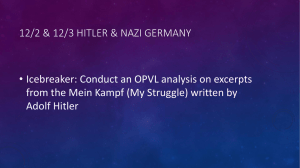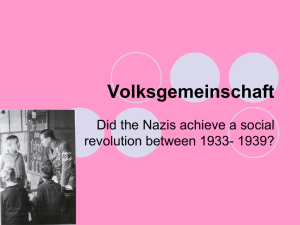1929 - 1933 - The British Empire
advertisement
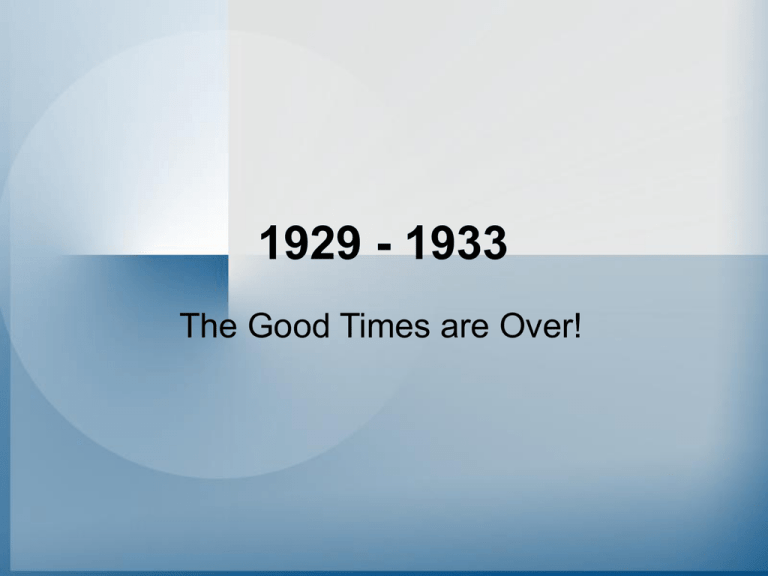
1929 - 1933 The Good Times are Over! 1929 – a bad year for Weimar • 1929 started off well for the Weimar Republic – Young Plan spread out German reparations until 1988 • In October, the Weimar Republic was rocked by 2 disasters. – 1) The Wall Street Crash – 2) The Death of Stresemann 1929 – a bad year for Weimar • In October, the Weimar Republic was rocked by 2 disasters. – 1) The Wall Street Crash • Why was this significant for Germany – 2) The Death of Stresemann • Why was this significant for the Weimar Republic The Impact of the Wall Street Crash Unemployment in Germany September 1928 650,000 September 1929 1,320,000 September 1930 3,000,000 September 1931 4,350,000 September 1932 5,102,000 January 1933 6,100,000 The Political Impact of the Depression • Cuts had to be made to government spending – The Social Democrats left the coalition due to cuts in unemployment benefit – Germany had to be ruled by decree. • Bruning uses article 48 • The worse the situation got for Germany, the more the Nazis prospered. – Explain what happened to the Nazi vote and number of seats between 1928 and 1933 Nazi Electioneering • List the Nazi party’s propaganda and electioneering tactics: – Remember that they are not in control of the country yet: so they still need to pay for everything. Nazi Election Tactics Nazi Electioneering – Pamphlets – Poster campaigns • Blanket flypostering – Printing Newspapers – Speeches • Hitler was a talented orator – Rallies • Bus activists to rallies to appear more popular than they actually are. – Intimidation • SA will beat up groups blamed by Nazis for Germany’s failures – Radio • Transmitting speeches and rallies – Air transport • To allow Hitler to appear in many places Nazi Electioneering • Write a Nazi election speech in 1932. Include blame for Germany’s problems on: – – – – – – • • • Treaty of Versailles Reparations payments Communists The Weimar Government Foreigners Jews Use repetition Use Exaggeration Do not feel constrained by the truth 1932 - 1933 Hitler Manoeuvres into Power The Collapse of Democracy • The Nazis manage to take advantage of the following factors to take control of Germany – 1) Dissatisfaction of Treaty of Versailles – 2) Economic Collapse and Unemployment – 3) Aggressive election tactics by Nazi Party – 4) Political Intrigue • Doing deals to gain power • The Nazis NEVER get a majority Date of Election SPD Social Democrats Communists KPD/USPD Centre Party (Catholics) DDP (Democrats) Jan 1919 Jun 1920 May 1924 Dec 1924 May 1928 Sep 1930 Jul 1932 Nov 1932 Mar 1933 165 102 100 131 153 143 133 121 120 22 88 62 45 54 77 89 101 81 91 64 65 69 62 68 75 70 74 75 39 28 32 25 20 4 2 5 63 157 156 174 134 90 66 83 72 32 14 12 107 230 196 288 Right-wing parties (BVP/ DVP/DNVP) NSDAP (Nazis) Others Total Deputies 7 9 29 29 51 72 11 12 7 423 459 472 493 491 577 608 584 647 1932 Hitler challenges Hindenburg • President Hindenburg is an old war hero. • Hitler feels strong enough to challenge him for the ultimate • Hitler loses – Hindenburg 53% – Hitler 36% • However, – Hitler surprises many be polling so many votes. – Hitler gets national media coverage Political Intrigue • May 1932 – General Schleicher asks Hindenburg to ask Franz von Papen (Catholic Party) to form a government. • replacing von Bruning – who had been anti-Nazi • July 1932 – Reichstag elections disaster for pro-weimar parties – Best result for Nazis • August 1932 – Hitler demands to be made Chancellor – Hindenburg dismisses the ‘Bohemian Corporal’ Political Intrigue • September 1932 – Von Papen loses a no-confidence vote • November 1932 – Another Reichstag election • Nazis lose 2 million votes! • But still too many anti-weimar parties with seats • Von Papen wants to be reappointed by Hindenburg and rule with Article 48 • General Schleicher puts himself forward – Wants to work with reasonable Nazis (Strasser) Von Papen’s revenge! • Hitler dismisses Strasser – No deals short of Chancellorship • Papen does a deal with Hitler behind Schleicher’s back – Hitler will be Chancellor – Von Papen vice-chancellor – Nazis given just 3 cabinet seats – Von Papen thought that he could control Hitler – Hindenburg tired of bickering Why did Hitler come to power? Mistakes by his opponents Hitler and the Nazi Party General Conditions in Germany Factors to Consider • Hitler’s promise to smash the • Communists • SA Intimidation • • Chancellors Bruning, von Papen • and Schleicher’s use of article 48 • Hitler promise to restore family • and moral values • • Von Papen’s double crossing of Schleicher • • Treaty of Versailles’ conditions • Hitler was an excellent orator • • The Nazis were in no way • responsible for the economic problems • Nazis becoming the largest political party Wall Street Crash Nazi Party Propaganda techniques Hindenburg was old and tired Schleicher thought he could appeal to reasonable Nazis Von Papen thought he could control Hitler Worldwide Depression Strasser’s inability to stand up to Hitler 6 Million unemployed
